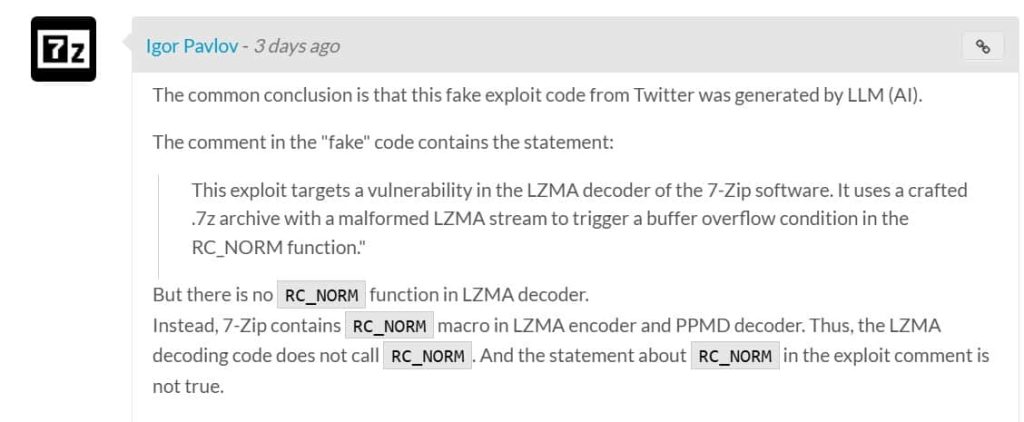Source: hackread.com – Author: Deeba Ahmed.
SUMMARY
- A user on X (@NSA_Employee39) claimed to discover a zero-day exploit for 7-Zip, alleging a critical buffer overflow vulnerability.
- The exploit purportedly involved a crafted .7z archive with a malformed LZMA stream to execute arbitrary code.
- Cybersecurity experts and 7-Zip creator Igor Pavlov dismissed the claim, citing non-existent functions and failed reproduction attempts.
- Researchers suggested the exploit code might have been generated by an AI, undermining its credibility.
- The incident highlights the persistent threat of zero-day exploits and the importance of robust cybersecurity measures.
The cybersecurity community recently faced a stir caused by a user on the social media platform X (formally Twitter), claiming to possess a zero-day exploit for the popular file archiver 7-Zip.
For your information, this user, under the handle @NSA_Employee39, alleged that they had discovered a critical vulnerability that could allow attackers to execute arbitrary code on a victim’s system by exploiting a buffer overflow within the 7-Zip software. The user provided a code snippet on Pastebin, purportedly demonstrating this exploit.
“This exploit targets a vulnerability in the LZMA decoder of the 7-Zip software. It uses a crafted .7z archive with a malformed LZMA stream to trigger a buffer overflow condition in the RC_NORM function. By aligning offsets and payloads, the exploit manipulates the internal buffer pointers to execute shellcode which results in arbitrary code execution,” the user wrote on Pastebin.
Despite the initial attention, cybersecurity experts quickly began to express doubts about the exploit’s validity. Attempts to replicate the exploit proved unsuccessful, leading to scepticism about the code’s effectiveness.
The claim was later dismissed by 7-Zip’s creator, Igor Pavlov, who stated that the alleged vulnerability relies on a function (“RC_NORM”) that does not exist in the 7-Zip LZMA decoder. Pavlov suggested that the code was likely generated by an AI model, further undermining its credibility.
Furthermore, security researcher @LowLevelTweets reported being unable to reproduce the claimed exploit, stating that it produced no crashes, hangs, or timeouts during their testing. These findings suggest that the reported 7-Zip zero-day may be a false alarm, potentially arising from artificially generated code or a misunderstanding of the software’s internal workings.
While this particular incident proved to be a false alarm, the threat of zero-day exploits remains a serious concern. These vulnerabilities are highly dangerous as they are unknown to software developers and thus lack any pre-existing defences.
Last month, Hackread reported a Windows zero-day vulnerability allowing attackers to steal NTLM credentials through a deceptive method. The vulnerability affected various Windows systems, including Windows Server 2022, Windows 11 (up to v24H2), Windows 10 (multiple versions), Windows 7 and Server 2008 R2.
To stay safe from zero-day exploits, comprehensive security software is important as it can provide essential protection against various threats, including viruses, malware, and zero-day exploits. These solutions typically include features like real-time threat detection, advanced threat defences, and strong privacy features to protect users from cybersecurity threats.
Original Post url: https://hackread.com/fake-7-zip-exploit-code-ai-generated-misinterpretation/
Category & Tags: Security,7-Zip,Cybersecurity,Scam,Vulnerability – Security,7-Zip,Cybersecurity,Scam,Vulnerability
Views: 3





















































